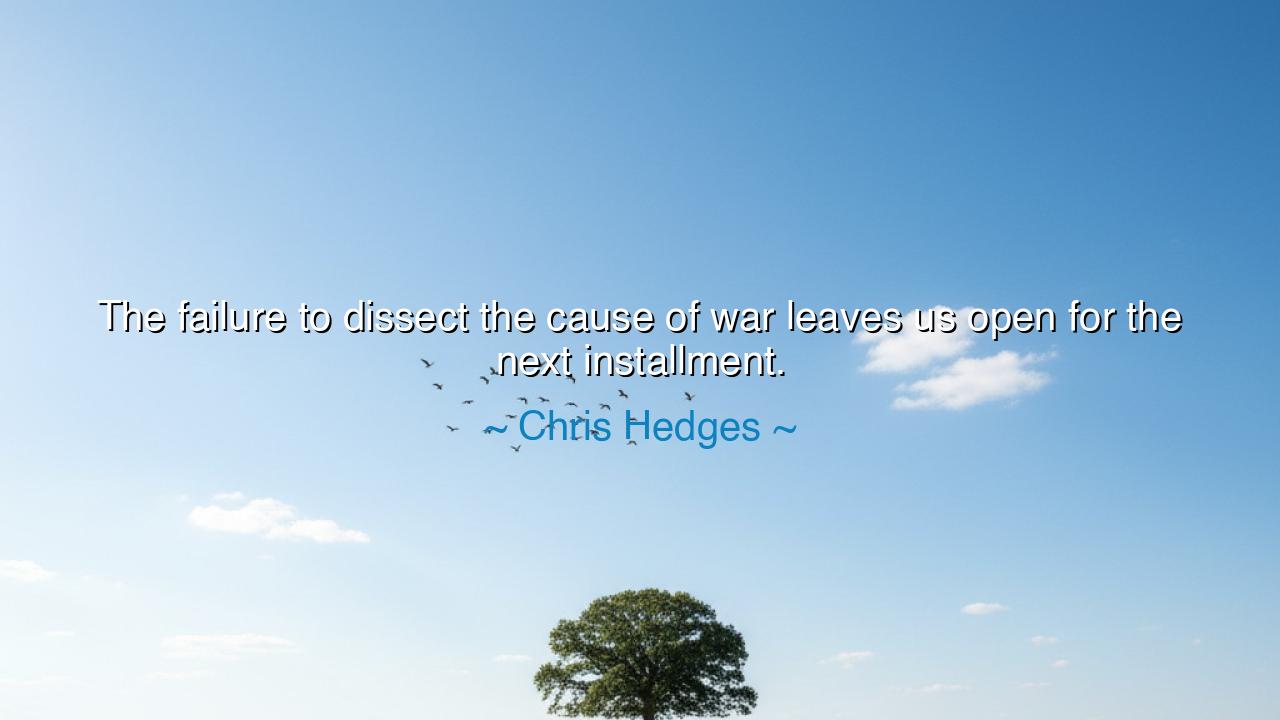
The failure to dissect the cause of war leaves us open for the






Host: The evening had deepened into a muted twilight, the fading light outside casting long shadows across the room. Jeeny sat on the couch, her legs tucked beneath her, the weight of the world outside seeming distant as she turned over the words in her mind. Jack, leaning against the windowsill, stared out into the evening, the world outside far from his thoughts. A quiet tension hung in the air, a conversation lingering just beneath the surface.
Finally, Jeeny broke the silence, her voice measured, but holding an underlying gravity.
Jeeny: “I came across something today that really struck me. Chris Hedges said, ‘The failure to dissect the cause of war leaves us open for the next installment.’ What do you think about that?”
Jack: (pauses, his voice thoughtful) “It’s powerful, isn’t it? It makes you think that maybe we’re just caught in this endless cycle. If we don’t understand why war keeps happening, if we don’t truly address the roots of it, we’re doomed to repeat the same mistakes over and over again. We’ll never get to the core of the issue, and we’ll keep heading back to the same place.”
Jeeny: (nodding, her voice calm but with a quiet urgency) “Exactly. It’s not just about the conflict itself. It’s about what leads to it, what enables it to happen in the first place. If we fail to learn from the past, then we remain blind to the factors that keep creating the conditions for war. We’re not preventing it, we’re just postponing it until the next time.”
Host: The stillness between them deepened, the weight of Jeeny’s words filling the room. Outside, the world seemed to continue its usual rhythm, but in here, the conversation was taking on a quieter, heavier tone. Jack turned his head slightly, as if absorbing the truth of her words, the realization that their understanding of the world’s conflicts wasn’t as clear as they might have hoped.
Jack: (his voice a little softer now) “I get that. But don’t you think it’s easier to just look at the symptoms—at the battles and the politics—than it is to go deep into the causes? People like to point fingers at what’s happening in the moment, but addressing the underlying issues, like inequality, greed, and power dynamics—that’s much harder. It’s easier to go to war than it is to truly fix the root causes.”
Jeeny: (leaning forward, her tone more urgent) “And that’s exactly why we keep failing. Because we don’t want to look at the uncomfortable truths. We’re willing to fight the battle in front of us, but we avoid the deep work that would actually prevent future conflict. It’s like putting a bandage over a wound without ever addressing what’s causing the bleeding.”
Jack: (his expression shifting, more reflective) “So, you think we need to stop just reacting to war and really address the things that make it possible in the first place? The things that create the conditions for it to happen again and again?”
Jeeny: (with a quiet intensity) “Yes. We need to look at what causes the hatred, the division, the desperation that leads to war. We need to understand the patterns, to see how history repeats itself, and then learn how to break that cycle. It’s not enough to simply stop one war; we have to address the conditions that make it inevitable in the future.”
Host: The air in the room seemed to hold its breath, as if the conversation had unlocked a deeper understanding between them. The quiet had grown heavy, the weight of the words settling between Jeeny and Jack like a shared truth. Outside, the world continued to fade into night, but within these walls, the conversation had sparked something, a realization that the true challenge was not just reacting to the world’s problems, but addressing the things that caused them.
Jack: (pauses, voice quieter now) “I guess we’re always so focused on the immediate—on stopping the violence, on fixing the current crisis. But maybe the real work is in the things we don’t see. The structural issues, the systems that perpetuate conflict.”
Jeeny: (nodding) “Exactly. We need to look deeper, question the systems that allow war to be the solution to our problems. If we keep ignoring those causes, we’re just setting ourselves up for the next round, for the next conflict. The failure to truly understand and address the root causes is what leaves us vulnerable to the same mistakes.”
Host: The room had grown quieter, more introspective, as if the weight of the conversation had reached a new depth. The light from the lamp softened their features, casting a gentle glow over the room, while outside, the world continued its usual rhythm. But here, in this moment, both Jeeny and Jack seemed to understand something that had been elusive before—the importance of not just reacting to war, but addressing the things that made it inevitable.
Jack: (after a long pause, his voice softer, almost resigned) “I guess the real challenge is in the understanding. It’s not enough to just fight the battles—we have to understand why we’re fighting in the first place.”
Jeeny: (nodding slowly, her voice gentle) “Yes. And when we do that, we might finally be able to stop the cycle, to break free from the patterns of the past and build something that can actually last.”
Host: The room felt a little quieter now, the weight of the conversation still lingering in the air. The evening outside had deepened into night, but within the room, there was a quiet sense of understanding, a shared realization that addressing the true causes of war was the only way to break the cycle. The world continued, but inside, there was a moment of clarity—one that, perhaps, could begin to shape a different future.






AAdministratorAdministrator
Welcome, honored guests. Please leave a comment, we will respond soon